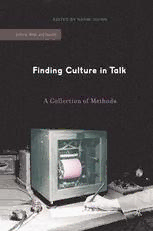
Finding Culture in Talk: A Collection of Methods PDF
Preview Finding Culture in Talk: A Collection of Methods
Culture, Mind, and Society T HE BOOK SERIES OF THE SOCIETY FOR PSYCHOLOGICAL ANTHROPOLOGY With its book series Culture, Mind, and Society and journal Ethos, the Society for Psychological Anthropology publishes innovative research in cul ture and psychology now emerging from the discipline of anthropology and related fields. As anthropologists seek to bridge gaps between ideation and emotion or agency and structure-and as psychologists, psychiatrists, and medical anthropologists search for ways to engage with cultural mean ing and difference-this interdisciplinary terrain is more active than ever. This book series from the Society for Psychological Anthropology establishes a forum for the publication of books of the highest quality that illuminate the workings of the human mind, in all of its psychological and biological complexity, within the social, cultural, and political contexts that shape thought, emotion, and experience. Series Editor Douglas Hollan, Department of Anthropology, University of California, Los Angeles Editorial Board Linda Garro, Department of Anthropology, University of California, Los Angeles Catherine Lutz, Department of Anthropology, Brown University Peggy Miller, Department of Anthropology and Speech Communication, University of Illinois, Urbana-Champaign Robert Paul, Department of Anthropology, Emory University Bradd Shore, Department of Anthropology, Emory University Carol Worthman, Department of Anthropology, Emory University Titles in the Series Adrie Kusserow, American Individualisms: Child Rearing and Social Class in Three Neighborhoods Naomi Quinn, editor, Finding Culture in Talk: A Collection of Methods Finding Culture in Talk A COLLECTION OF METHODS Edited by Naomi Quinn ISBN 978-1-4039-6915-6 ISBN 978-1-137-05871-3 (eBook) DOI 10.1007/978-1-137-05871-3 ISBN 978-1-4039-6915-6 To all our students, those who took our classes and those who found their way to our doors, for contributing to our research, adapting our methods to their own projects, and helping us figure out how to find culture in talk. Contents List of Tables and Figures Vlll Notes on Contributors IX Chapter One Introduction 1 Naomi Quinn Chapter Two How to Reconstruct Schemas People Share, From What They Say 35 Naomi Quinn Cha pter Three Some Methods for Studying Cultural Cognitive Structures 83 Roy D'Andrade Chapter Four Uncovering Cultural Models of Gender from Accounts of Folktales 105 Holly F. Mathews Chapter Five Finding Culture in Narrative 157 Jane H. Hill Chapter Six Analyzing Discourse for Cultural Complexity 203 Claudia Strauss Chapter Seven "Good Enough" Methods for Life-Story Analysis 243 Wendy Luttrell Index 269 List of Tables and Figures Tables 4.1 Rewrite Rules for a Story Grammar of La Llorona Morality Tales 116 4.2 Texts and Functional Analyses for Two Versions of the La Llorona Tales 119 4.3 Symbols and Descriptions for Functions in the La Llorona Tales 123 4.4 Specific Actions that Comprise Each Function by Gender of the Characters 124 4.5 Variant Types of Male Versions of the Tale as Analyzed by Sequences of Functions 127 4.6 Variant Types of Female Versions of the Tale as Analyzed by Sequences of Functions 130 4.7 Models of the Mediation of Opposition in Folktales (Adapted from E. K. Maranda and P. Maranda 1971:36, 89-90) 139 Figures 4.1 A Diagram for the Rewrite Rules for a Morality Story Grammar 116 4.2 Diagram of Rewrite Rules for Folktale M-30 118 4.3 Diagram of Rewrite Rules for Folktale F-28 118 4.4 Diagram of Models of Mediation from E. K. Maranda and P. Maranda (1971:89-90) 138 4.5 Diagrams of Models of Mediation for Initial Marital Conflicts in the Six Type Variants of the La Llorona Tales 140 4.6 Diagram of the Concatenation of Models of Mediation in the Type Variants of the La Llorona Tales 144 Notes on Contributors Roy D'Andrade obtained his PhD at Harvard in 1962. He is Professor of Anthropology at University of Connecticut. His interests are in cognitive anthropology, general theory, quantitative methods, and American cul ture. Among his many publications are The Development of Cognitive Anthropology (Cambridge, 1995) and the volume coedited with Claudia Strauss, Human Motives and Cultural Models (Cambridge, 1992). He is a Fellow of the American Academy of Arts and Sciences (elected 1990) and a Member of the National Academy of Sciences (elected 1998). Jane H. Hill earned her degree at UCLA in 1966. She is Regents Professor of Anthropology at University of Arizona. Her interests are in general linguistics, language and culture, sociolinguistics of Native American languages-most notable Mexicano-and language, race, and political economy. She is coeditor (with Judith Irvine) of Responsibility and Evidence in Oral Discourse (Cambridge, 1993), coauthor (with Kenneth C. Hill) of the book, Speaking Mexicano: Dynamics of Syncretic Language in Central Mexico (Arizona, 1986), and author of many other publications. She is past president of the American Anthropological Association, and currently editor-in-chief of the journal Language in Society, and a Fellow of the American Academy of Arts and Sciences (elected 1998). Wendy Luttrell obtained her PhD from UC-Santa Cruz in 1984. She is Associate Professor at the Harvard Graduate School of Education. She conducts research in the United States, investigating class/gender/race rela tions and consciousness, especially in the context of American schooling. Her other interests are in the sociology of knowledge, sexuality, and femi nist theory. Her most recent book is Pregnant Bodies, Fertile Minds; Gender, Race, and the Schooling of Pregnant Teens (Routledge, 2003). Her first book, Schoolsmart and Motherwise: Working-class Women's Identity and Schooling (Routledge, 1997)-the conduct of research for which she describes in this volume-won the 1998 Oliver Cromwell Cox Award from the American Sociological Association's Section on Racial and Ethnic Minorities. Holly F. Mathews earned her PhD degree from Duke University in 1982. She is Professor of Anthropology at East Carolina University. Her research and theoretical interests include psychological anthropology, gender roles,
